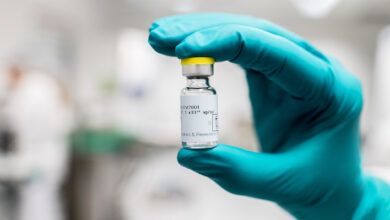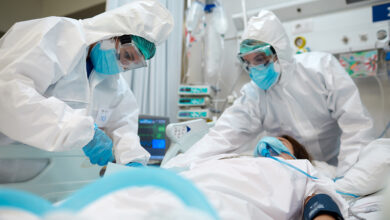COVID-19 or RSV? Symptoms to watch for

[ad_1]
An unusual summertime uptick in respiratory syncytial viral infections, or RSV, coinciding with increasing spread of the delta variant may create difficulty in differentiating between the two.
CLICK HERE TO FIND A COVID-19 VACCINE NEAR YOU
The respiratory viruses share several common symptoms, and reports of both RSV and COVID-19 cases are on the rise; RSV had an approximate 3% positivity rate in June before rising to 13% by mid-July, according to the latest federal figures, which may represent an undercount due to lags in reporting. Meanwhile, the U.S. just logged 103,455 new daily COVID-19 infections with a seven-day average of about 89,463 cases per day, translating to a 43% increase over the prior seven-day average, according to Dr. Rochelle Walensky, director of the Centers for Disease Control and Prevention (CDC).
SARS-CoV-2, or the virus causing COVID-19 disease, is a respiratory virus associated with a range of symptoms, and it takes a couple of weeks for an infected individual to fully recover. Although most people do recover from COVID-19, some who were infected experience lingering symptoms, or so-called long COVID, while others (like people who are elderly, overweight or with previous underlying health conditions) may suffer a severe course of disease.
Symptoms associated with COVID-19 include:
- Fever or chills
- Cough
- Shortness of breath or difficulty breathing
- Fatigue
- Muscle or body aches
- Headache
- New loss of taste or smell
- Sore throat
- Congestion or runny nose
- Nausea or vomiting
- Diarrhea
FAUCI WARNS MORE SEVERE COVID-19 VARIANT COULD EMERGE AS CASES RISE: US ‘COULD REALLY BE IN TROUBLE’

Most people do not have to be hospitalized for COVID-19 or Respiratory Syncytial Virus Infection, but the chances increase with age and underlying conditions
(iStock)
COVID-19 CASES IN CHILDREN SURGE 84% IN 1 WEEK, STUDY FINDS
Meanwhile, RSV is a common respiratory virus that typically causes mild, cold-like symptoms. According to the CDC, most children likely had an RSV infection by the age of 2. While most adults recover within one to two weeks, RSV can be dangerous for infants and the elderly.
For children younger than 1 year, RSV is the most common cause of bronchiolitis and pneumonia. Symptoms of RSV usually come in stages and can include, but are not limited to:
- Runny nose
- Decrease in appetite
- Coughing
- Sneezing
- Fever
- Wheezing
CLICK HERE TO GET THE FOX NEWS APP
Fox News’ Kayla Rivas contributed to this article
[ad_2]
Source link





